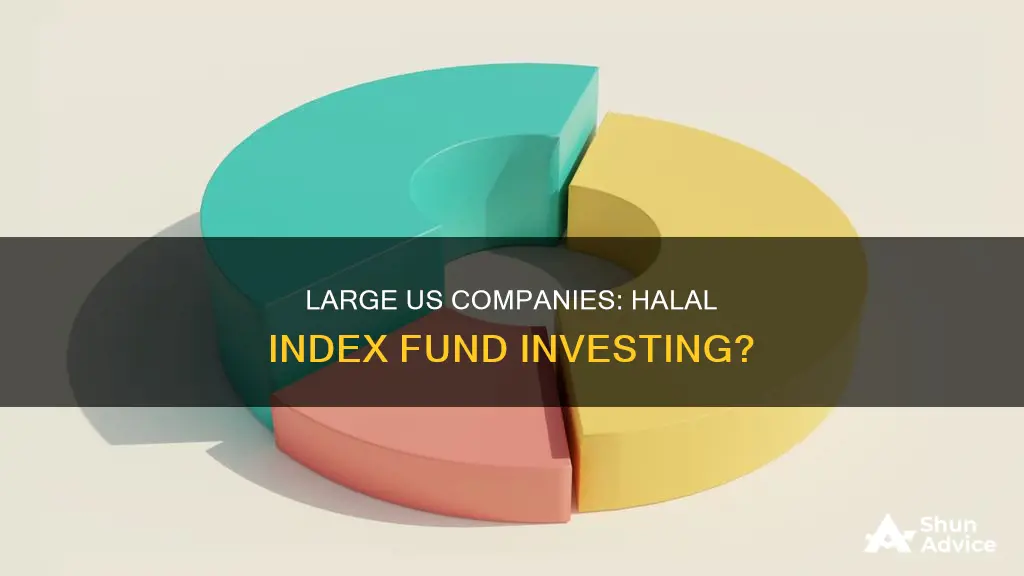
Investing in index funds is a popular choice for many investors, offering a passive form of investing with low risk and broad market exposure. However, for Muslim investors, the challenge lies in finding index funds that align with Islamic financial principles, or Shariah compliance. This is because most index funds contain stocks that are not Shariah-compliant, such as those involved in financial services, alcohol, gambling, or pork. As a result, Muslim investors often face a limited choice of funds that meet their religious and ethical standards. The concept of halal investing adheres to Islamic principles and involves investing in companies that are socially responsible and avoid activities like gambling, selling pork or alcohol, and charging interest. While there are a few Shariah-compliant index funds available, they may have higher fees and less diversification than conventional funds. This has led to a growing demand for more Shariah-compliant investment options, particularly in the United States, where around 51% of listed stocks comply with Shariah principles.
| Characteristics | Values |
|---|---|
| Definition | A religious form of investing that complies with Islamic law or Shariah |
| Type of Fund | Index fund |
| Type of Investing | Passive |
| Risk | Low |
| Compliance | Must be certified as Shariah-compliant |
| Industries to Avoid | Gambling, alcohol, tobacco, weapons, adult entertainment, traditional finance, pork products |
| Other Considerations | No element of interest (riba), speculation or gambling (maisir), transactions involving uncertainty (gharar) |
What You'll Learn

Halal investment guidelines
Investing is a way of securing financial stability for yourself and your loved ones. However, conventional forms of investing don't always align with Islamic values. As a result, halal investing has become increasingly popular within and outside the Muslim community.
Halal investing is a form of ethical investing that complies with Islamic principles derived from the Qur'an, Hadith, and Sunnah. At its heart, halal investing redirects wealth into ethical ventures and divests from social ills.
Four Basic Principles of Halal Investing:
Focus on Asset-Based Investments:
In Islam, money is considered a medium of exchange with no intrinsic value. Using money to make money is considered haram. Asset-based investments, such as real estate or stocks, focus on acquiring physical assets with intrinsic value.
Avoid Riba (Interest):
Another key principle is the prohibition of riba, or interest. Interest is considered haram because it implies excessive compensation without an appropriate value exchange. Any profits derived from interest are considered riba as no intrinsic value is provided.
Avoid Prohibited Industries:
Halal investors should avoid industries that are harmful to the body, mind, soul, or society. These include industries that manufacture, promote, or sell goods and services violating Islamic principles, such as interest-bearing financial products, alcohol, gambling, or pornography.
Avoid Excessive Risk and Uncertainty:
Halal investors should also avoid investments with excessive risk and uncertainty (known as gharar). Transactions that lack transparency in terms, conditions, or payments should be avoided. Examples include contracts with unclear clauses, short-selling, or deferring payment to an unspecified future date.
Halal Investment Options:
Stocks:
Purchasing stock gives you partial ownership in a corporation, making you entitled to a portion of its profits and assets. Stocks are halal as long as the company's industry and financial practices comply with Islamic law.
Exchange-Traded Funds (ETFs) and Mutual Funds:
ETFs and mutual funds pool money from multiple investors to purchase a diversified portfolio of securities. While determining their Shariah compliance can be challenging due to the variety of assets, there are tools available to help with the screening process.
Sukuks (Islamic Bonds):
Sukuks are similar to bonds but are not debt-based. Instead of profiting from interest, investors in sukuks make money from a fixed percentage of the company's business profits.
Real Estate:
Real estate is a tangible asset that usually appreciates over time. Purchasing real estate is halal as long as interest-bearing loans are not used. Islamic financial institutions offer mortgage loans without interest for those looking to invest in property.
Gold and Precious Metals:
Investing in gold and precious metals is a secure and halal form of investment as long as they are acquired and sold at a fair price.
Venture Capital:
Halal investors with financial resources and industry knowledge can participate in venture capital investing, providing funds and guidance to small and medium-sized businesses in exchange for equity.
Crowdfunding:
Crowdfunding pools small amounts of money from multiple investors for a specific company or project, usually through an online platform. Investors receive equity shares proportionate to their contribution, making it a good option for those starting with limited funds.
Haram Investments to Avoid:
Bonds:
Bonds are loans made to corporations, governments, or organizations with a fixed interest rate. They are considered haram because profits are derived from interest.
High-Yield Savings Accounts:
These accounts offer an annual percentage yield, which represents interest earned. As interest is prohibited in Islam, these accounts are not halal.
Derivatives:
Derivatives are financial contracts whose value is determined by underlying assets. They are considered haram due to the excessive risk, uncertainty, and speculation involved.
Foreign Exchange Trading:
Forex trading involves speculating on fluctuating exchange rates between currencies. The majority view among Islamic scholars is that forex trading, especially in the retail market, is not permissible due to its conflict with Islamic financial principles.
Halal investing offers a way for Muslims to grow their wealth while upholding their faith's principles. By focusing on asset-based investments, avoiding interest and prohibited industries, and minimising excessive risk, halal investors can find rewarding opportunities to secure their financial future.
Tips Funds: A Guide to Smart Investing
You may want to see also

Sharia principles relating to index funds
- No element of interest (riba): Sharia law prohibits Muslims from investing in businesses involved in interest-based transactions. This is because the Quran states that those who engage in it are waging a battle against God. Any interest earned from non-compliant investments is directed towards charitable purposes in a process known as "purification" or "cleansing".
- Ethical investments: The investments should be ethical and should enhance communities and society, in line with the social justice element of Islamic finance. This includes refraining from investing in companies that cause harm to others or the environment.
- No speculation or gambling (maisir): Sharia law discourages short-term speculation and frequent trading, as some Islamic scholars interpret this as a form of gambling.
- Risk and profit-sharing: Both parties in the transaction should share the risks and profits.
- No uncertainty (gharar): There should be no transactions involving uncertainty.
- Asset backing: Every financial investment and transaction must relate to a tangible asset.
- Impermissible industries: The industries, businesses, and companies within the fund should not be deemed impermissible in Islam. This includes companies involved in the sale of alcohol, pork products, pornography, gambling, military equipment, weapons, and tobacco. It also includes financial services such as insurance companies and banks.
The Mindset of Investment Fund Managers: Traits and Insights
You may want to see also

Advantages of investing in halal index funds
Halal index funds have become an increasingly popular investment vehicle for those looking to maximise their investments without breaching Islamic finance principles. Here are some of the key advantages of investing in halal index funds:
Compliance with Sharia Principles
One of the main advantages of investing in halal index funds is knowing that your investment complies with Sharia principles. Halal index funds ensure that your money is not invested in industries prohibited by Islamic finance principles, such as the gambling, alcohol, and pornography industries.
Ethical and Socially Responsible Investing
Halal index funds offer investors the opportunity to invest in an ethical and socially responsible manner. By excluding impermissible industries, halal index funds ensure that investments are made in companies that enhance communities and society, in line with the social justice element of Islamic finance.
Diversification and Risk Mitigation
Halal index funds provide diversification across a wide range of companies within one fund, reducing the risk associated with investing in individual stocks. This diversification lowers the overall risk of the investment, as the performance of the fund is not tied to a single company.
Low Costs and Accessibility
Halal index funds are typically passively managed, resulting in lower fees compared to actively managed funds. The availability of diverse halal index funds, including foreign companies, also provides accessible investment options for individuals at various levels, from beginners to experienced investors.
Long-Term Appreciation
The aim of halal index funds is to create long-term appreciation of investment funds through a diversified portfolio of securities and investments that comply with Islamic finance principles. Revenue is generated when the value of the portfolio increases, providing an opportunity for investors to grow their wealth over time.
Regulatory Oversight
In the United Kingdom, halal index funds are regulated by the Financial Conduct Authority, providing an additional layer of oversight and protection for investors.
With the increasing demand for Sharia-compliant and ethical investment options, halal index funds offer a viable option for those looking to invest in a manner that aligns with their values and financial goals.
Strategies for Investing Your Self-Managed Super Fund
You may want to see also

Considerations for investors wanting to invest in halal index funds
As with any investment, there are risks involved when investing in halal index funds. Here are some key considerations for investors wanting to enter this market:
- Risk of investment value decreasing: As with any investment, there is a chance that the value of your investment in a halal index fund could decrease. It is important to remember that while index funds are generally considered less risky due to their diversification, there is still a level of risk involved.
- Exchange rate risks: Volatility in the economy and markets can cause exchange rates to fluctuate, which could affect your investment gains. This is particularly relevant for investors looking at foreign companies as a way to diversify their portfolio.
- Tracking risks: While index funds aim to mirror the performance of the index they track, there may be occasional differences in gains.
- Operational risks: Halal index funds, like any other fund, are subject to operational and compliance risks that could impact profits or returns.
- Certification: Ensure that any fund you invest in has been certified as compliant with Sharia rules by a reputable organisation or Islamic scholars.
- Diversification: Look for funds that offer a wide range of companies and industries within the fund to lower your overall risk.
- Fund fees: Check what fees your investment will incur as these can eat into your profits.
- Minimum investment levels: Some funds require a minimum investment level, so check this before choosing a fund to ensure it aligns with your financial goals and capabilities.
- Information: Do your research and seek expert advice if needed to ensure you understand the fund and its potential risks and rewards.
It is important for investors to carefully consider their options and conduct thorough research before investing in halal index funds, as with any other type of investment.
ISA Funds: A Guide to Smart Investing
You may want to see also

How to build your own halal index fund
Index funds are a great way to invest your money, but many Muslim investors are excluded from most index funds as they often contain impermissible investments. Here are two ways you can build your own halal index fund:
- Mimic existing funds and remove haram holdings: Take an existing ETF or mutual fund and remove the haram holdings. This can be done manually or by using an automated solution like the Zoya app, which filters fund holdings based on their Shariah compliance.
- Build your own from scratch: Create your own index fund according to your individual preferences. Ensure you have the right number of stocks and a mix of different industries that are uncorrelated to balance your risk.
- Have a good mix of conservative, moderate, and aggressive growth stocks to manage your risk appetite.
- Monitor the Shariah compliance of companies periodically as their financial behaviour can change and affect their compliance.
- Use semi-automated solutions offered by low-cost or zero-fee brokers to invest in a basket of companies at a low cost and in a time-efficient manner.
- Look for funds with low expense ratios to avoid high fees.
- Diversify your portfolio by investing in foreign companies.
- Do your due diligence and make sure the index fund you invest in has been certified as compliant with Sharia rules.
Mutual Fund Investors: Declare Investments in Your ITR
You may want to see also
Frequently asked questions
Halal investing is an approach that adheres to Islamic principles. It is faith-based, designed to drive value not only for investors but also for the community. It follows guidelines shaped by Islamic scholars on topics such as interest, debt, risk, and social responsibility.
The main principles of Islamic finance that should be considered when looking for halal index funds to invest in include: no element of interest (riba), ethical investments that enhance communities and society, no element of speculation or gambling (maisir), shared risks and profits, no transactions involving uncertainty (gharar), and asset backing.
Some examples of large US companies that are considered halal for investment include Apple, Berkshire Hathaway Inc, and UnitedHealth Group Inc.







